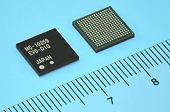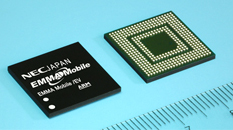ARM Cortex-A9 SoC will include onboard DRAM
Dec 7, 2010 — by LinuxDevices Staff — from the LinuxDevices Archive — 16 viewsRenesas Electronics says one version of its newly announced, downsized ARM Cortex A9 SoC (system on chip) will sport onboard DRAM. Aimed at multimedia players, e-readers, and networked TVs, the EMMA Mobile EV0 devices support 1080p HD video playback and are one-third smaller than their predecessors, the company adds.
According to Renesas, its new EMMA Mobile EV0s are successors to the EMMA Mobile EV, which were originally announced in February with single or dual ARM Cortex-A9 cores. Again touted as providing full HD video playback for MPEG2, MPEG4, and H.264, the 40nm-fabricated EV0s (below left) have been squeezed down to a 9 x 9mm package, rather than the 16 x 16mm of the earlier EVs (below right), the company says.


The downsized EMMA Mobile EV0 (left) and earlier EMMA Mobile EV (right)
Reneseas hadn't posted block diagrams at the time of writing, and also hasn't said whether the EV0s will be offered in both single- and dual-core versions. There appears to be more going on here than mere die-shrinking, however, since the company says the EV0 will optionally be available with "optimal-size" DRAM on board.
According to Renesas, its EMMA Mobile EV0-D will include an unspecified amount of DRAM created using SIP (system in package) technology. "In addition to supporting system miniaturization, this also obviates the need for designing a high-speed interface with an external DRAM and contributes to easier end-product circuit-board design," the company said in a statement.
The SoC will also be available without DRAM on board as the EMMA Mobile EVO-S, the company added.
No word was provided about other changes relative to the larger EMMA Mobile EVs, but it seems possible the SoCs will get upgrades from the Imagination Technology SGX530 2D/3D graphics engine that was previously used. (Yesterday, Imagination cited Renesas as having adopted upgraded graphics IP in a new SoC, but did not provide further specifics.)
The specifications that have been released by Renesas so far for its EMMA Mobile EV0-D and EV0-S devices are as follows:
- CPU: Cortex-A9 (I-cache: 32Kbyte, D-cache: 32Kbyte, 533MHz)
- On-chip memory: SRAM 128Kbyte, ROM 64Kbyte
- External bus interfaces:
- 16-bit NOR flash interface
- LP-DDR-400 (200MHz)/DDR2-533 (266MHz) 32-bit SDRAM interface (EV0-S)
- AV Engine:
- H.264 decode: BP/MP/HP up to full HD (1920 × 1080) 30fps
- MPEG2 decode: MP up to full HD (1920 × 1080) 30fps
- MPEG4 decode: SP/ASP up to HD (1280 × 720) 30fps
- VC-1 decode: SP/MP/AP up to full HD (1920 × 1080) 30fps
- MP3, AAC(HE-AAC), WMA decode
- AC-3 decode (Dolby Digital 5.1ch)
- Graphics engine — 2D (Open VG 1.1)
- Image processing
- resizer
- rotator (0, 90, 180 and 270 degree)
- image composer with alpha blending, key color masking and gamma correction
- DMA controller — 8 channels
- Timer — interval timers and watchdog timers
- Peripheral interfaces
- Serial interface — UART (6 ports), IIC (2 ports), unified serial (SPI/Audio, 4 ports)
- SD interface (card: 1 port, SDIO: 2 ports)
- eMMC interface
- image interface — camera (parallel), LCD (parallel), ITU-R BT.656 interface
- general purpose input/output
- USB2.0: host or device 1 port with PHY
- Power supply
- Core logic: 1.1 V
- IO: 1.8 V, 2.85V
- USB power supply: 3.3V
- Packaging:
- EV0-D — 256-pin 9 x 9mm FPBGA 0.5mm pitch
- EV0-S — "t.b.d."
Renesas did not cite planned operating system support for the EMMA EV0-D and EV0-S, but the devices will obviously be technically capable of running Linux, Windows CE, or Windows Embedded Compact 7.
Further information
According to Renesas, the EMMA Mobile EV0-D and EVO-S are scheduled to go on sale in April 2011, priced at $35 or $30 respectively in sample quantities. Mass production, scheduled to begin in October 2011, is expected to reach 1,000,000 units per month, the company adds.
This article was originally published on LinuxDevices.com and has been donated to the open source community by QuinStreet Inc. Please visit LinuxToday.com for up-to-date news and articles about Linux and open source.